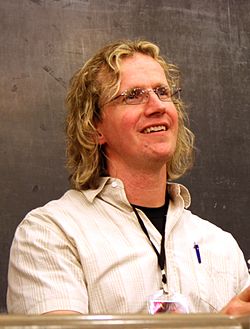This article has multiple issues. Please help improve it or discuss these issues on the talk page . (Learn how and when to remove these messages)
|
R. Scott Bakker | |
|---|---|
 Bakker at SFeraKon 2009 | |
| Born | February 2, 1967 Simcoe, Ontario, Canada [1] |
| Occupation | Philosopher/Novelist |
| Genre | Science Fiction/Fantasy |
| Website | |
| rsbakker | |
Richard Scott Bakker (born February 2, 1967) [1] is a Canadian fantasy author. He grew up on a tobacco farm in the Simcoe area. [2] [3]